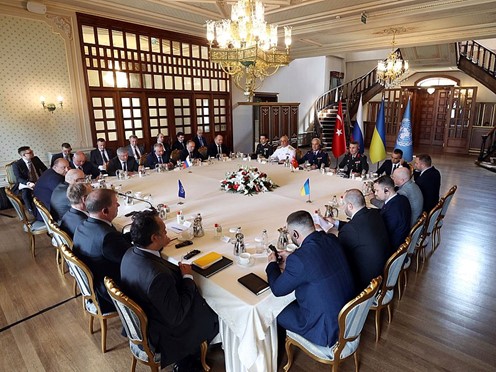
The four participants to the negotiations in Istanbul of the Black Sea Grain Initiative: Russia, Ukraine,Turkey and the United Nations, July 2022.
“Russia’s goal is to wrest more concessions… Russia wants to increase the volume of grains and fertilizers it’s exporting through the corridor at Ukraine’s expense.”
Russian resumption of its participation in the Black Sea Grain Agreement, following Turkey’s facilitation and mediation, helped to alleviate some concerns of a global food crisis.[i] However, it was not clear what benefits Russia received for returning to the deal. The accompanying passages by Turkish experts offer some such rationales.
In the first accompanying passage from the regionally focused independent news site al Monitor, journalist Amberin Zaman writes that Russia wants to export more grain and fertilizer through the Black Sea corridor at Ukraine’s expense. Zaman also writes that Russia wants to resume ammonia exports via Ukraine. She notes that following Russia’s invasion of Ukraine, Kiev shut down a pipeline carrying Russian ammonia—a key ingredient in the production of nitrate fertilizers—to the Black Sea port of Odessa..
In the second accompanying passage from the Turkish independent news platform Dördüncü Boyut via YouTube, Turkish foreign affairs commentatorFehim Tastekin claims that Russia likely received some written guarantees that the grain corridor would not be used for military purposes.[ii] He notes Russia’s claim that the explosives used to destroy the Kerch Bridge had been brought from Odessa on a ship using that grain corridor. As such, he claims that Russia’s main benefit would be to spotlight this attack approach. He also claimed that Russia returned to the deal to avoid the perception that it was the cause of a global food and hunger crisis. Both of these views would support Russian narratives as part of their information operations.
Sources:
Amberin Zaman, “Turkey seeks to coax Russia back into Ukraine grain deal,” al-Monitor (independent news platform with local reporting from the Middle East), 1 November 2022. https://www.al-monitor.com/originals/2022/11/turkey-seeks-coax-russia-back-ukraine-grain-deal#ixzz7k8s1EXZp
Analysts say Russia’s goal is to wrest more concessions. “They want better terms for themselves via Turkey,” said Yevgeniya Gaber, a former Ukrainian diplomat… Gaber believes that Russia wants to increase the volume of grains and fertilizers it’s exporting through the corridor at Ukraine’s expense.
Russia also wants a resumption of ammonia exports via Ukraine. A pipeline carrying Russian ammonia, a key ingredient in the production of nitrate fertilizers, to the Black Sea port of Odessa ceased to function following Russia’s February 24 invasion of Ukraine. The United Nations has been pressing the sides to reach an agreement.
Russia likely also wants Ukraine to halt its offensive to retake Kherson, a critical port city in the country’s south, a demand that Ukraine will almost certainly spurn as it seeks to consolidate its recent battlefield gains.
Fehim Tastekin, “Arap Birliği’nin Türkiye’yi kınama iddiası ne anlama geliyor? (What does the Arab Union’s condemnation of Turkey mean?),” Dördüncü Boyut via YouTube (independent Turkish news and analysis platform on YouTube), 2 November 2022. https://www.youtube.com/watch?v=ruZyRUhjuE8&t=510s
Russia likely received some written guarantees that the grain corridor would not be used for military purposes. An important detail that has been missed in the Turkish media is Russia’s claim that the explosives used to destroy the Kerch Bridge had been brought from Odessa on a ship using the grain corridor. So the most important concession that Russia received is likely a halting of attacks on its ships in the Black Sea, to move the conflict inland. Russia also wants to avoid the perception that it is the cause of a global food and hunger crisis.
Notes:
[i] For a background on Turkey’s control over access to the Black Sea and the Montreux Treaty, see: Karen Kaya, “Turkey Views Treaty as Important to Limiting U.S. Naval Activity in Black Sea,” OE Watch, May 2021.
[ii] This video was later unavailable as Turkey suspended YouTube on 13 November 2022.
Image Information:
Image: The four participants to the negotiations in Istanbul of the Black Sea Grain Initiative: Russia, Ukraine,Turkey and the United Nations, July 2022.
Source: https://commons.wikimedia.org/wiki/File:IMO_welcomes_maritime_humanitarian_corridor_in_Black_Sea_(52233881214).jpg
Attribution: CC BY 2.0
